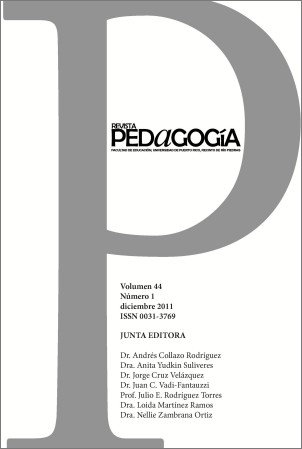Abstract
This paper analyzes the formal education of teachers as an essential element of constructivist and humanistic educational reforms. This process requires: a clear concept about the nature of teaching as an activity that promotes learning; the appropriation by teachers of a new educational culture, that is of concepts and values that will frame and structure their teaching-learning practices; and a set of human-professional competencies for designing and implementing educational systems that will foster learning and human development.
How to cite:
Villarini-Jusino, A. R. (2011). Reflexión en torno a una experiencia de 25 años: La formación de los docentes es la piedra angular de las reformas educativas. Pedagogía, 44(1), 193-211. Rectrieved from https://revistas.upr.edu/index.php/educacion/article/view/16567
References
Amarel, M. (1988). Developmental teacher education. En Dialogues in teacher education (Issue paper 88-4). East Lansing, MI: National Center for Research on Teacher Education.
Andrés, G. & Echeverri, P. (2001). Pensamiento docente y práctica pedagógica. Una investigación sobre el pensamiento práctico de los docentes. Bogotá: Magisterio.
Aponte Roque, A. (1992). Sistema educativo de Puerto Rico. Trayectoria de realidades y necesidades. San Juan, Puerto Rico: Consejo de Educación Superior.
Bailey K., Curtis, A. & Nunan, D. (2001). Pursuing professional development. Boston: Newbury House.
Brickhouse, N. (1990). Teachers‘ beliefs about the nature of science and their relationship to classroom practice. Journal of Teacher Education, 41(3), 53-62.
Carlgren, I., Handal, G. & Vaage, S. (1994) Teachers‘ minds and actions. Research on teachers‘ thinking and practice. London: Routledge/Falmer.
Coll, C. (1992). La reforma del sistema educativo español: La calidad de la enseñanza como objetivo. Colección Educación, Nº 4, Instituto FRONESIS, Quito.
Czerniak, C. M., & Lumpe, A. T. (1996). Relationship between teacher beliefs and science education reform. Journal of Science Teacher Education, 7(4), 247-266.
Delors, J. (1996). La educación encierra un tesoro. Informe de la UNESCO de la Comisión Internacional sobre la Educación para el siglo XXI. Ediciones UNESCO. España, Madrid.
Garet, M. S., Porter, A. C., Desimone, L., Birman, B. F., & Yoon, K. S. (2001). What makes professional development effective? Results from a national sample of teachers. American Educational Research Journal, 38(4), 915-945.
Freire, P. (1969). La educación como práctica de la libertad. México: Siglo XXI.
Freire, P. (1970). Pedagogía del oprimido. México: Siglo XXI.
Freire, P. (1990). La naturaleza política de la educación. Barcelona: Paidós.
Freire, P. (1993). Pedagogía de la esperanza. México: Siglo XXI.
Houston, W. R. (Ed.). (1996). Handbook of research on teacher education. New York: Macmillan.
Manning, B. & Payne, B. (1993). A Vygotskian-based theory of teacher cognition: Toward the acquisition of mental reflection and self-regulation. Teaching and Teacher Education, 9(4), 361-371.
Pedró, F. & Puig, I. (1998). Las reformas educativas. Una perspectiva política y comparada. Paidós: Barcelona.
Pineda Rodríguez, A. (2008). Pedagogos contemporáneos postmodernos latinoamericanos. Revista Electrónica de Humanidades, Educación y Comunicación Social, 5(3) Recuperado de http://www.dialnet.unirioja.es/servlet/fichero_articulo?codigo=2737294&orden=0
Rojas Osorio, C. (2010). Filosofía de la educación. De los griegos a la tardomodernidad. Colombia: Editorial Universidad de Antioquia.
Sanjurjo, L. (2002). La formación práctica de los docentes. Reflexión y acción en el aula. Santa Fe: Homosapiens.
Schiefelbein, E. & Tedesco, J. C. (1995). Una nueva oportunidad. El rol de la educación en el desarrollo de América Latina. Buenos Aires: Santillana.
Subirats, J. & Nogales, I. (1989). Maestros, escuelas, crisis educativa. Santiago: UNESCO-OREALC.
Villarini Jusino, A. R. (1987). Principios para la integración del currículo. San Juan, P.R.: Departamento de Instrucción Pública.
Villarini Jusino, A. R. (1990). Nueva concepción del desarrollo docente. Bayoán. Enseñar es educar la razón, 1(3).
Villarini Jusino, A. R. (1997). El currículo orientado al desarrollo humano integral. San Juan, P.R.: Biblioteca del Pensamiento Crítico.
Villarini Jusino, A. R. (2001). Teoría y práctica del pensamiento sistemático y crítico. Biblioteca del Pensamiento Crítico: San Juan, P.R.
Villarini Jusino, A. R. (2008a). El desarrollo humano como fenómeno complejo. Una perspectiva crítica y emancipadora. Crecemos. Revista Hispanoamericana de Desarrollo Humano y Pensamiento, 10(1), 9-10.
Villarini Jusino, A. R. (2008b). Reflexiones sobre la naturaleza de la filosofía y sus implicaciones para la filosofía de la educación. Tere. Revista de Filosofía y Socio Política de la Educación, 8(4), 5-12.
Villarini Jusino, A. R. (2010a). 20 años de OFDP. Crecemos. Revista Hispanoamericana de Desarrollo Humano y Pensamiento, 10(1), 9-10.
Villarini Jusino, A. R. (2010b). 25 años de experiencia con el modelo de pensamiento crítico. Crecemos. Revista Hispanoamericana de Desarrollo Humano y Pensamiento, 10(1), 9-10.
Villarini Jusino, A. R. & Adam, E. (2009) Andragogía. El pensamiento socioedicativo de Félix Adam y la. Una antología. Barranquilla, Colombia, y San Juan, Puerto Rico: Fundación para la Calidad de la Educación y Biblioteca del Pensamiento Crítico.
The contents published in the Puerto Rico Journal of Education is freely distributed under open access practices, in accordance with the Creative Commons license, Attribution-NonCommercial 4.0 International (CC BY-NC 4.0). Through these principles, the journal and its authors allow readers to access, reproduce and share articles in full text. Users should give credit to authors in a reasonable way without suggesting they have their support. Under no circumstances, readers may make use of the contents for commercial purposes. The authors retain copyright on their works.

